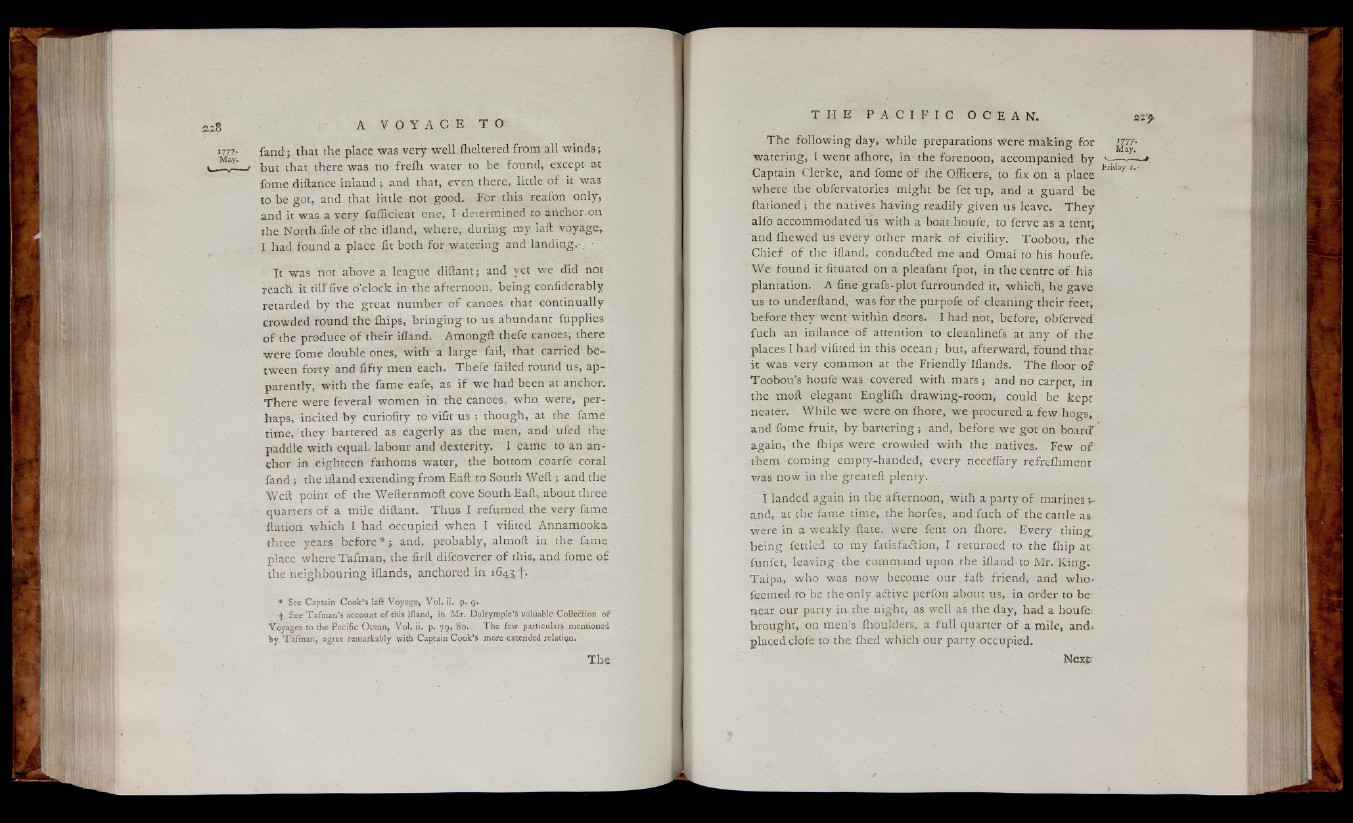
1777- fand;. that the place was very well iheltered from all winds;
Ma- > but that there was no freih water to be found, except at
fotne diftance inland -, and that, even there, little of it was
to be got, and that little not good. For this reafon only,
and it was a very fufficient one, I determined to anchor.on
the North fide of the iiland, where, during my laft voyage,
I had found a place fit both for watering and landing.-. ■
It was not above a league diffant; and yet we did not
reach It tillfive o’clock in the afternoon, being confiderably
retarded by the great number of canoes that continually
crowded round the fhips, bringing to us abundant fupplies
o f the produce of their iiland. Among!! thefe canoes; there
were fome double ones, with a large fail; that carried between
forty and fifty men each. Thefe failed round us, apparently,
with the fame eafe, as if we had been at anchor.
There were feveral women in the canoes, who were, perhaps,
incited by curiofity to- vifit us ; though, at the fame
time, they bartered as eagerly as the men, and ufed the
paddle with equal, labour and dexterity. I came to an anchor
in eighteen fathoms water, the bottom coarfe coral
fand ; the iiland extending from Eaft to South Weil; and the
Weft point of the Wefternmoft cove South-Eaft,.about three
quarters of a mile diftant. Thus I refumed the very fame
ftation which I had occupied when I vifited Annamooka
three years before*; and, probably, almoft in the fame
place where Tafman,. the firft difcoverer of this, and fome o£
the neighbouring iflands, anchored in 16.43, t:
* See Captain Cook’s laft Voyage,- Vol. ii. p. 94
f. See-Tafman’s account of this iiland, in Mr. Dalrymple’S valuable Colle&ion of
Voyages to the Pacific Ocean, Vol. ii. p. 79, 80. The few particulars mentioned
by Tafman, agree remarkably with Captain Cook’s more extended relation.
The following day-, while preparations were making for ^77-
watering, I went aihore, in the forenoon, accompanied by 4—I tS ;
Captain Clerke, and fome of the Officers, to fix on a place *nday
where the obfervatories might be fet up, and a guard be
ftationed ; the natives having readily given us leave. They
alfo accommodated us with a boat houfe, to ferve as a tent;
and ihewed us every other mark of civility. Toobou, the
Chief of the iiland, conduced me and Omai to his houfe.
We found it fituated on a pleafant fpor, in the centre of his
plantation. A fine grafs'-plot furrounded it, which, he gave
us to underftand, was for the purpofe of cleaning their feet;
before they went within doors. I had not, before, obferved’
fuch an inftance of attention to cleanlinefs at any of the
places I had vifited in this ocean; but, afterward, found that
k was very common at the Friendly Iflands. The floor of
Toobou’s houfe was covered with mars ; and no carpet, in
the moft elegant Engliffi drawing-room, could : be kept
neater. While we were on ffiore, we procured a few hogs;
and fome fruit, by bartering; and, before we got on board '
again, the fhips were crowded with the natives. Few of
them coming empty-handed, every neceffafy refreihment
was now in the greateft plenty.
I landed again in the afternoon, with a party of marines i~
and, at the fame time, the horfes, and fuch of the cattle as
were in a weakly ftate, were lent on fhore. Every thing,
being fettled to my fatisfatftion, I returned to the ffiip at
fu n fet, leaving the command upon the iiland-to Mr. King.
Taipa, who was now become our faft* friend, and who*
feemed to be the only atftive perfon about us, in order to her
near our party in the night, as well as the day, had a houfe.-
brought, on men’s ffioulders, a full quarter of a mile, and»
placed.clofe to the ffied which our party occupied.